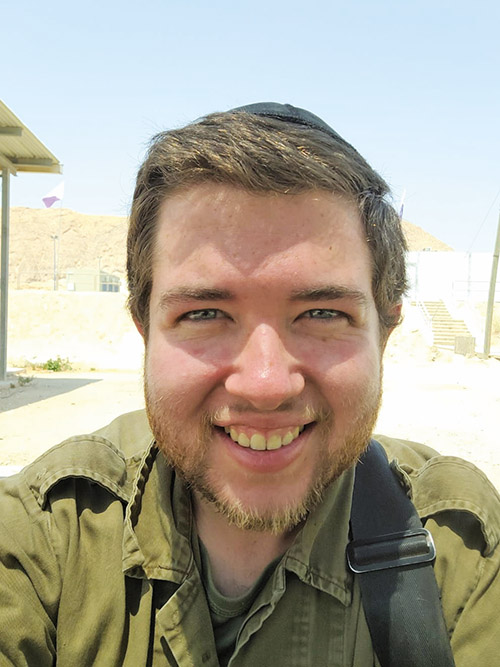
The very eloquent Akiva (Gideon) Rubin, formerly of Livingston, New Jersey, agreed to an interview just short of finishing up his army service in the Givati Brigade. He is serving as a lone soldier as part of Yeshivat HaKotel’s Hesder program. He is currently going through the process of making aliyah from within Israel, and his parents Rachel and Alan Rubin are very supportive of his decision.
Aviva: What are your early memories of Israel?
Akiva: The first time I visited Israel was for my cousin’s wedding when I was in seventh grade and my sister was in seminary. I remember my parents being excited that it was my first trip to Israel. It was a long time since they had both been there and they were very excited to go back.
I went to Kushner, in Livingston, which is a very Zionistic school. From a young age, everyone knows and loves Israel. The entire school goes to the Celebrate Israel Parade. There are Israeli flags everywhere, and it’s very emphasized that Israel is the country of the Jews. So, with this previous information, even as a seventh grader, you know this is it.
Aviva: Did you come to Israel for a summer program?
Akiva: Yes, I went on NCSY Kollel, which was incredible. NCSY Kollel is more stationary because of the learning, but they offer a lot of tiyulim (day trips including hikes). I went on the tiyulim any time I could, and it was incredible. We were encouraged to do the hikes and see Israel’s natural beauty. Combined with the learning, it just put it all in perspective.
Aviva: Tell me about your experience at Yeshivat HaKotel.
Akiva: On the first day, we were greeted at the airport by the rebbeim, who were singing “V’Shavu Banim L’Gvulam.” I had never heard this song in my life, and then only after all the learning, it became something that’s so powerful. The first time we saw the Kotel, Rav Taragin explained that it’s Makom HaMikdash. It’s not just a place to visit but where Jews are meant to be. Throughout the year, the yeshiva took us to Beit El and Elon Moreh and so many other places that are referenced and centralized in the Tanach, which emphasizes the reality that Israel is the place for the Jews.
Aviva: What motivated you to join the army as a lone soldier?
Akiva: I have three main reasons. One is from Parashat Matot-Masei, where it says, “Ha’Achechem yavoh’u l’milchama v’atem teshvu po?” (“Your brothers are fighting a war and you are sitting here?”) First came the decision of the army and then came the decision of aliyah. I figured, even if I want to live my life in America, everyone else is serving in the army and this is what Jews do. This is part of the process of what everyone who’s 18 is doing in Israel, and I should be doing it also.
Another reason is that there are very few capacities in which you’re able to serve all of Am Yisrael. One of them is through Talmud Torah, which includes teaching and learning, and the other is serving in the army. I wanted to take part in those avenues.
The last reason was because serving in the army gives you an insight into the entire culture. It’s a vehicle for integrating into Israeli society and making aliyah.
Aviva: What do your parents think about you being in the army and deciding to make aliyah?
Akiva: Thank God, they were very receptive and supportive of what I’ve decided to do. I recognize that it’s hard for them—it’s not easy for any parent when their child is very far away and in the army.
Aviva: Do you miss anything about living in New Jersey?
Akiva: I miss my friends and my family. I miss the convenience of things there. Here, to go to a grocery store, I have to take two buses. In the States, I could just drive. I also miss Pop’ems, everything at Dougie’s, and Frank’s Red-Hot Sauce. Israel is incredible in high-tech, but they’re still lacking basic necessities like hot sauce.
Aviva: Do you have a message for young people who live in the New Jersey area?
Akiva: There are two types of people. There are those who speak about values and there are those who sacrifice for values, and often, it’s challenging to recognize where you are and what you’re going to do. Everyone should do what they feel they’re meant to be doing within the framework of Torah values.
By Aviva Zacks













